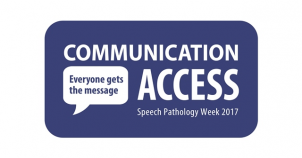This week is Speech Pathology Week, an initiative of Speech Pathology Australia. The week aims to promote the profession and is campaigning for standards on “communication access” for those with communication disabilities – similar to those that apply to wheelchair access.
Pesel & Carr are proud to be supporting such an important campaign, and to be helping everyone get the message about communication access.
Communication access is enabling people with communication disabilities to get their message across by removing barriers to communication or providing extra assistance.
Compared with the general population, people with communication support needs are more likely to: be unemployed or underemployed; have difficulty accessing services such as education and healthcare; be misdiagnosed; and to be misjudged as not able to comprehend.
Hundreds of thousands of Australians of all ages live with a communication disability, including people who stutter, stroke survivors, people who have Parkinson’s disease or multiple sclerosis, and patients who have undergone treatment for head and neck cancers.
Fletcher, age 7, has a diagnosis of autism spectrum disorder that impacts his ability to speak.
With the help of speech pathologist, Elizabeth Lea, of Communication Toolbox, Fletcher learned to use a symbol-supported app called Proloquo2Go which enables him to communicate things like what he would like to eat, or that he needs to go to the bathroom.
Margot, 85, lives in a Melbourne care facility, where her best friend is the elderly woman in the room next door. Every night, they sit together at dinner. However, until recently, they had never shared a simple conversation.
Both women are still in full possession of their mental faculties. The problem is that Margot is physically unable to speak loudly, and that her friend is hard of hearing.
Enter speech pathologist Olga Birchall, who introduced Margot to an electronic voice amplifier that enabled the friends to talk to each
The National President of Speech Pathology Australia, Gaenor Dixon, said communication is a basic human right.
“As a community, we’ve failed to accommodate those with a communication disability in the same way we have for physical disability and wheelchairs, however there’s a strong case for individuals, governments and organisations to do more,” she said.
“Communication disabilities are common, and can have devastating effects on people’s ability to work, get access to services, learn, socialise and express their point of view. That comes with economic and social costs.
“How you can help depends on the communication difficulty. It might be rephrasing your question in simple language, giving extra time or using pictures, writing, sign and gesture, or symbols to help. For businesses, measures can include clear signage including symbols as well as words, the use of plain English and staff training.
“Ultimately, speech pathologists believe the best way forward is to develop national standards on communication access – so everyone can get their message across.”
Speech Pathology Australia is holding a forum on communication access in Melbourne this week as part of Speech Pathology Week, and has produced a range of video case studies to raise awareness of the issue.
You can view the case studies, here.


